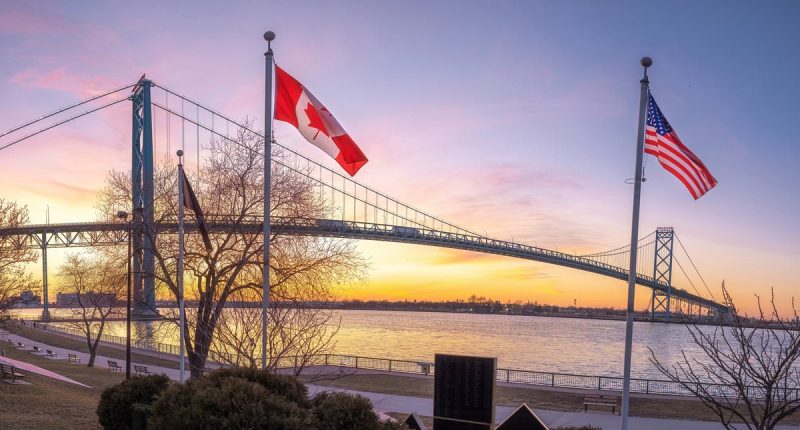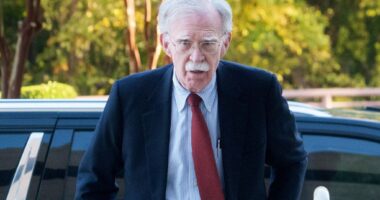Share this @internewscast.com
Detroit has become one of the hardest hit cities in the fallout of America’s deteriorating relationship with Canada.
The Michigan metropolis on Canada’s border has seen traffic from neighboring Windsor drop and suffering businesses slash jobs.
Business leaders and elected officials are concerned that the White House’s policies are forcing the sister cities in to an unwanted ‘break up.’
Ryan Donally, the CEO of the Windsor Essex Chamber of Commerce, remarked that the border, while present, has never been a significant cultural issue, as reported by the Financial Times.
Donally elaborated that the current trade tensions are damaging the social ties between Detroit and Windsor, making it more painful because it’s not merely about business or taxes.
‘This has damaged the cultural relationship between two best friends.’
One of the most critical links between Detroit and Windsor is the car industry, which is currently under a 25 percent tariff.
Detroit, often referred to as Motor City, has historically been a hub for automobile production and has seen considerable industrial investment recently, following years of downturn.

Detroit, known as Motor City, has long been a destination for auto manufacturing
However, the industry relies on cross-border collaboration. Companies such as Stellantis and Ford build car parts in Windsor and thousands of Canadians travel over the border every day to work in plants in Detroit.
Trump’s car tariff has already led to layoffs in Windsor with some members of the Canadian Tooling & Machine Association cutting half their workers.
Among them is Louis Jahn, owner of Jahn Engineering in Windsor, who has cut his 70-person staff by 20 percent after his orders from American carmakers disappeared due to the cost of tariffs.
Jahn told the FT that like many businesses he will be forced to raise prices.
‘In the end, consumers are going to pay for it,’ he said.
As well as the car industry, 6,000 Canadian healthcare workers cross the border every day to work in Detroit’s hospitals and doctors offices.
18 percent fewer people are arriving in the US via the Windsor-Detroit Tunnel compared to the same time last year, according to the Windsor-Detroit Tunnel Corporation.
While commuting remains consistent, those traveling from Canada to Detroit to visit family or friends or for leisure has dipped.

Ford builds engines in Windsor, Ontario, placing it under tariff strain

18 percent fewer people are arriving in the US via the Windsor-Detroit Tunnel

The Ambassador bridge links Detroit, Michigan, with Windsor, Ontario

Windsor mayor Drew Dilkens said ‘we feel like we’re under attack by the president’
Deteriorating relations also led Windsor mayor Drew Dilkens to cancel funding for an hourly bus service between the cities.
It would cost the Canadian city $1.4 million a year to run, and Dilkens said Trump’s rhetoric – including threatening to annex Canada into the 51st state – has made it impossible to ask for taxpayer money to fund it.
‘We feel like we’re under attack by the president of the United States,’ he told the FT.
Detroit is not the only border city that is feeling the sharp end of Trump tariffs.
Buffalo and Niagara have both been hit by large downturns in Canadian visits.
Further south, Palm Springs in California has been the target of a boycott by Canadian vacationers and many ‘snow birds’ are selling their holiday homes in Florida.

















